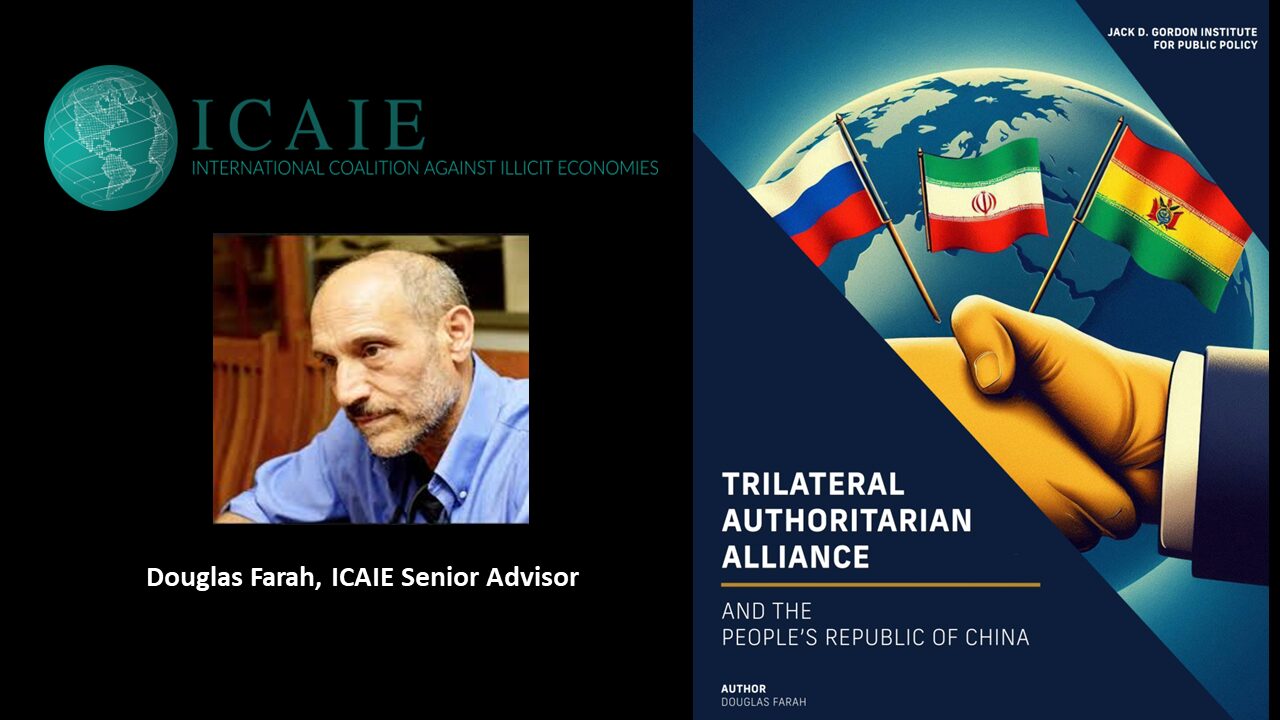Trilateral Authoritarian Alliance and The People’s Republic China
New ICAIE Report for FIU: Trilateral Authoritarian Alliance and The People’s Republic China
(Winter/January 2025)
Authors:
Doug Farah, Senior Advisor and Director for Latin America Programs, International Coalition Against Illicit Economies (ICAIE)
Description:
Over the past decade an alliance of authoritarian regimes has systematically built an interlocking series of echo chambers and media amplification nodes across Latin America for disinformation, misinformation and malign influence operations to undermine U.S. policy and actions in the hemisphere. The primary actors are Russian and Iranian state media and their regional allies of the Bolivarian alliance led by the Maduro regime in Venezuela.
The main actors in this trilateral alliance are: Russia, through it state-owned Actualidad RT (the Spanish language RT, regionally headquartered in Mexico City) and Sputnik Español (Sputnik in Spanish, regionally headquartered in Santiago, Chile); and the Maduro regime and its Latin American allies through the mutli-state owned TeleSur, television and media platforms (based in Caracas, Venezuela) and tied to the Spain-based Canal Red network (Madrid, Spain); and Iran, through its state-run media and it’s 24/7 Spanish-language satellite service, HispanTV (headquartered in Tehran, Iran).
The Chinese government has also invested heavily in creating its own strong Spanish language media presence in Latin America and associated disinformation and disinformation networks. However, the PRC network, while sometimes echoing themes of the trilateral group, operates largely independently, with different strategic goals and purposes. The PRC has billions of dollars invested across the region to protect and expand Chinese national interests while the Russia-Iran-Bolivarian alliance has almost no economic interests in the region and seek primarily to be a source of instability to the United States. As one analyst defined the difference.
While the PRC is interested in displacing U.S. influence in the region and presenting itself as a reliable partner of choice in trade and economic development, it is also interested in stability and predictability, something that could place it at odds with the Trilateral Alliance’s intent on creating chaos and fomenting insecurity in the future.
For Russia, building influence in Latin America is a means to the end of disrupting Western alliances and institutions. For China, it is a means of building support for Beijing’s way of doing business. For that reason, in this report, we will treat the external actors Russia and Iran, along with their Bolivarian alliance allies collectively, as the Trilateral Alliance and the PRC as a separate actor.
These transnational security vectors converge to collectively harm the United States and its allies in an increasing great power competition environment, including the leveraging of criminal proxies.
Among the Recommendations and Conclusions:
The United States, through multiple administrations, has yet to formulate a coherent, expansive, and persistent whole of government strategy to counter these efforts in Latin America, leaving the U.S. in a significantly weakened position in the hemisphere. U.S. policy initiatives, small in comparison to its adversaries, are undermined by coordinated messaging campaigns and growing isolation in a range of multilateral forums.
These multifaceted efforts have eroded credibility and trust in the United States as a reliable ally and partner, across multiple strategic theaters, including economic, military and defender of democracy and the rule of law in a region where it has been the predominant power for more than a century.
Across the region both friends and foes alike say Washington’s shrinking presence in the region may have reached a tipping point, where there is such a gap in the information and strategic communications theater that the United States is now no longer really a competition at all. As one Southern Cone media analyst said, “The U.S. keeps talking about strategic competition but it is like a soccer match where only one team shows up to play. The U.S. is close to forfeiting the match in Latin America.”
All sides will engage in intensifying competition over information, disinformation, and messaging operations on key strategic issues such as democratic governance, environmental protection, and sustainable development, rule of law, and transparency. Public perceptions in Latin America regarding these areas will help determine whether the United States will have the opportunity to build new, vibrant democratic alliances or whether the authoritarian wave will continue to rise.
Perhaps, it is time for the United States to launch a comprehensive “Marshall Plan” economic aid initiative for the Americas to compete with the growing geopolitical influence and security footprint of China, Russia, and Iran in hemisphere, and bring back some allies back into a trusted network of democracies, and away from the coercive economic pull of today’s authoritarian malign adversaries.
Publisher
Florida International University (FIU)
Find the New ICAIE Report for FIU


